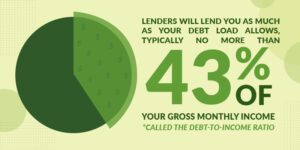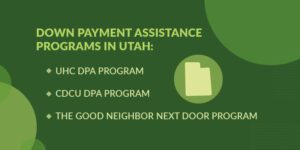In a world where things are constantly changing, the one thing you can rely on is the many benefits of homeownership. A home will always be a great investment for your future and it’s never too soon to prepare for that big step. If you’re anticipating buying a home in Utah in the near future, it’s all a matter of being prepared. The friendly, knowledgeable team of experts at Sego Homes can’t wait to help you become a homeowner! Here’s our guide for first-time home buyers in Utah:
Begin Your Journey To Buying A Home In Utah
Becoming a homeowner is an exciting time, but the process can be trickier than anticipated for inexperienced homebuyers. There are a few things you need to do to prepare, but the biggest ones are to get your financial ducks in a row and have your paperwork in order.
- Check your credit score. The three credit bureaus are each required to give you a free credit report once a year. Avoid last-minute surprises by checking your score long before you make an offer. And work diligently to correct any mistakes.

- Determine what you can afford. Lenders will lend you as much as your debt load allows, typically no more than 43% of your gross monthly income (called the debt-to-income ratio). There are online calculators to help you determine what you can afford.
- Have a plan. Most conventional mortgages require a 20% down payment. If you’re not able to swing that, there are alternatives. The FHA offers loans with lower down payments. HUD offers a variety of programs by state. When planning your saving strategy, remember that banks like to see stable funds in your account for 60 to 90 days before applying for a loan.
- Get your documentation together. Banks are very particular about mortgages. They require a lot of paperwork. Collect these documents before you need them. It will make life so much easier.
- W-2 forms — or business tax return forms if self-employed — for the last two to three years
- Personal tax returns for the past two to three years
- Most recent pay stubs
- Credit card and all loan statements
- Bank statements
- Addresses for the past five to seven years
- Brokerage account statements for the most recent two to four months
- Most recent retirement account statements, such as 401(k)
- Get pre-approved. Make an appointment with your lender or mortgage broker. Bring all your paperwork. He/she will run a credit check and tell you how much loan you’re approved for.
- Start shopping. Once you’re pre-approved, you will be able to look for homes that meet your priorities and your price range. And you won’t waste time looking at or making offers on homes you can’t afford.
- Complete a home inspection. At Sego Homes, we inspect every phase of construction to ensure that your home meets our high standards. We invite you to see for yourself through a home inspection. The inspection is an important step that includes checking the home for any issues that need to be addressed so that you’re as confident as possible on closing day.
- Prepare for Closing Day! Before you arrive, there are a few items you’ll want to bring:
- Photo Identification – a driver’s license, passport, or government-issued photo ID
- Final Payments/Closing Costs – confirm with escrow company how these should be paid
- Proof of Homeowners Insurance
- Closing Disclosure – compare this with the final paperwork
- Home Inspection Reports
What Else Is There to Know About How To Buy A Home In Utah?
When discussing how to buy a home in Utah, it’s worth noting that the state has a very competitive housing market. Here’s a rundown of some other considerations for homebuyers:

- Down payment assistance. DPA programs help first-time homebuyers afford housing. In Utah, there are numerous DPA programs that provide eligible participants with a grant or second mortgage to cover closing costs or a down payment. Here are just a few options:
- UHC DPA program. The Utah Housing Corporation offers down payment assistance to those who qualify for a UHC first mortgage. Financial aid is given as a 30-year second mortgage of up to 6% of the first mortgage. Household income and home purchase price limits apply and vary by county.
- CDCU DPA program. The Community Development Corporation of Utah offers down payment assistance to first-time homebuyers in Salt Lake City, Salt Lake County, and Taylorsville. Assistance depends on the location of the home and household income.
- The Good Neighbor Next Door program. The Good Neighbor Next Door program is a program for firefighters, police officers, and teachers that allows them to buy HUD homes for 50% off when they meet the qualifications.
- Home inspections. Utah law requires sellers to disclose any issues to buyers, but some problems may go unnoticed. To ensure a home is completely safe and move-in ready, homebuyers are advised to conduct inspections before closing. In addition to a general home inspection, consider:
- Radon testing: Certain areas in Utah are prone to elevated radon levels, which can harm your health if not mitigated. All new Sego Homes are radon system ready!
- Termite inspection: Some lenders require buyers to have a pest inspection. Termites or other unwelcome critters can cause property damage or become health hazards, so checking for infestations is wise.
- Closing costs. In Utah, closing costs are fees that are paid in addition to the net property amount. The seller usually covers the cost of title insurance here, while the buyer will cover expenses including a separate title policy for their lender, an appraisal fee, lender fees, and miscellaneous other costs. Be sure to budget for these in addition to your down payment. In Utah, real estate transactions are usually closed by escrow agents and title companies.
- Additional expenses. Expenses include more than just the price of the home and the associated costs. Aside from the principal amount, interest, and taxes/insurance, new homeowners must also consider utilities, commuting costs, and home necessities. If you choose a neighborhood with HOA fees, you need to know how much they are and if they could increase.
Are There Any Tax Breaks For Utah Homeowners?
It’s no secret that most of us do not like paying taxes. But there are also a variety of tax breaks available for Utah homeowners, as well.
- Penalty-free IRA payouts. For first-time home buyers, there is a penalty-free IRA payout for those who break into their IRAs for their down payment. This exception does not apply to withdrawals from 401(k) plans. To qualify for the penalty-free payout, you must use the money to buy or build your first home within 120 days of the time you withdrew.

- First-time home buyer tax credit. First-time homebuyer tax credits are credits against federal income taxes offered to people who purchase their first home. The credit is a refundable tax credit. So the tax credit you receive offsets the federal taxes you owe. Unlike a deduction, which reduces your taxable income, a tax credit offsets the taxes you owe on a dollar-for-dollar basis.
- Mortgage interest. The ability to deduct mortgage interest on your taxes continues to be the biggest benefit of homeownership. The interest paid throughout the year is deductible on your taxes for mortgages of up to $750,000, which is a combined total for first, second or additional homes. This limit applies to mortgages acquired after 2017.
- Property taxes. According to the Tax Foundation, the typical Utah homeowner pays a rate of 0.59 percent of the property’s assessed value — one of the lowest rates in the nation. However, rates vary by school district, water improvement district, and a number of other qualifiers. Property taxes can be deducted as part of the state and local taxes. The taxes are built into your monthly payment, and you can deduct only the actual property tax amounts paid out during the year. New homeowners can take one deduction that consists of property tax as well as income taxes and state and local sales.
- Home office. If you work from home and have an office space in your new home, you may be able to deduct costs for space on your itemized tax return. Deductions are limited to self-employed individuals who work predominantly from their home office. Your home office can’t be in any space used for a dual purpose, and it must be used regularly.
For New Homes In Utah, Contact Sego Today!
Sego Homes has over 40 years of experience, so you can trust we’ve worked with many Utah home buyers. Our homes in Utah are in great locations with ample opportunities for employment as well as family-friendly lifestyles. When you’re ready, we’re happy to answer any questions you have about our process, floorplans, communities, and more. Connect with us today to get started.





